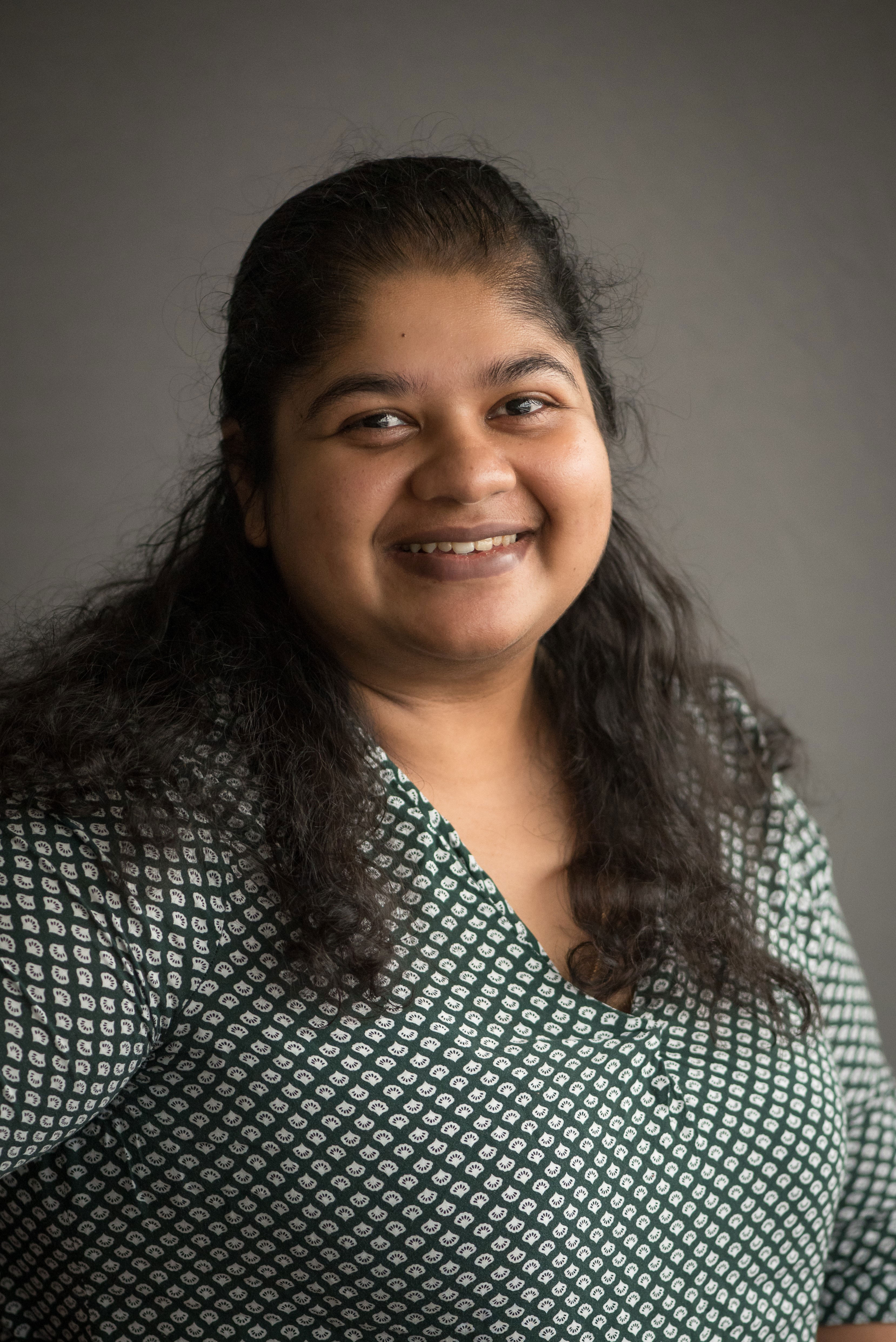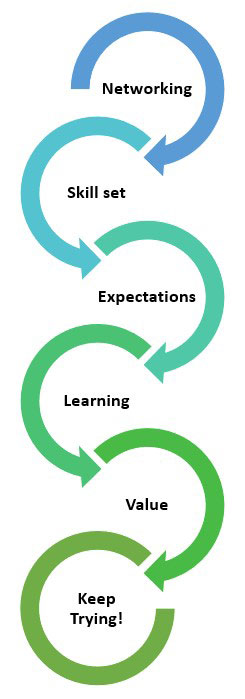Atrouli Chatterjee
Finding your first post-Ph.D. job is a daunting task for many of us. It represents an intersection in our career path and the opening and closing of different “doors” of opportunity. Starting the job hunt also forces us to come to terms with the changes that will result from taking this step, such as disruptions to the habits and routines that we have developed and a potential move away from support networks that we have fostered.
Nevertheless, many have gone through this arduous process and have come out on the other side with wisdom to share. To allow others to benefit from their experience, I have conducted an anonymous survey of a group of 22 Ph.Ds. to ask them about their job-hunting advice.
Demographics and background
First, a quick look at the background of the survey respondents. About 55% of the surveyed individuals are in academia, followed closely by around 40% who work in industry positions, and around 10% are part of nonprofit or nongovernmental organizations.
Over 90% of the respondents secured positions within six months of searching, and over 50% of the respondents had offers in their hands between three and six months before defending. A little more than 40% of the individuals applied to fewer than five positions before finding their first post-graduate job. Around 30% of respondents applied to five to 10 positions, around 10% applied to 10 to 20 positions, and around 20% applied to over 20 positions before finding their first post-graduate job.
In short, there is no right or wrong answer to when you should be applying for positions or how many positions you should apply for.
Advice for the job search
Respondents generally encouraged preparing application materials tailored to each position, but they more specifically gave advice that fell into three main categories:
Network, network, network!
Many in the group emphasized the importance of actively growing a network, and noted that networks both take time to build and require a continuous effort to maintain. While you may not need to have deep, long-lasting connections with every single person in your network, it helps if you have a personal connection or something they can remember you by. Some respondents suggested that you start networking at least 18 months before your target end date, so you can connect with and learn from individuals who hold positions you are interested in.
Leverage and grow your skill set
If you are looking for jobs that are strictly within the skill sets that you have developed during your degree, respondents recommend doing a thorough search for jobs requiring those skills (using, for example, specific instrumentation that you may have used). You should also consider relevant positions that may have job titles outside of what might be thought of as “mainstream” academic or industry positions, like consultant or project-management roles. Furthermore, it may be advantageous to focus on your specific skill set rather than the field in which you did your dissertation, to expand the scope of potential opportunities.
If you are targeting specific positions, leverage the opportunities that your institution offers to take additional coursework (for instance, management classes or certificate programs) that can strengthen your resume or application profile. Particularly for those interested in nonacademic positions, look for internship opportunities in your chosen sectors. Internships not only provide behind-the-scenes insight into what it might be like to work at the organization but also give you the chance to network with the people who may become your colleagues if you do take a job there.
Know what you want and get what you need
One of the hardest questions you have to ask yourself when deciding what comes after your Ph.D. is, “What do I actually want to do?” It may seem as though the answer should be simple, but often we do not know what different positions are actually like to work in. If you are in a lab with postdocs, perhaps you have some idea of what a postdoc position is like, but even that varies greatly between labs, departments and schools.
To overcome this challenge, some respondents recommended informational interviews—talk to people about their current and previous jobs. Go to on-campus information sessions, reach out to alumni, talk to that “friend of a friend,” etc. Essentially, lean into the network you have built and the resources that your school offers to learn as much as you can about the positions and organizations you are interested in.
Other advice suggested considering questions like: How much independence do you want? Do you want to run a team or be part of a team? Do you want to do benchwork? Identifying what you want to do can help you narrow down what positions you might want to apply for. This self-reflection also gives you a better idea of what questions you might want to ask your extended network about a position and will enable you to have a stronger, more tailored application.
Advice for starting your first job
Once you start your first post-PhD job, or any position for that matter, there are a few things to remember:
Understand and manage expectations
Your new role will come with its own set of expectations; it is important to understand your employer’s expectations of you and communicate your expectations to your employer. Parallel changes in your professional and personal life can require re-prioritization of your time and effort, and having a clear idea of your professional obligations can allow you to manage your time more effectively.
Starting a new position can be very different from the Ph.D. work you just finished, and you should give yourself time to adapt to your new environment and role.
Be open to challenges and be gentle with yourself. Starting a new position can be very different from the Ph.D. work you just finished, and you should give yourself time to adapt to your new environment and role. Embrace opportunities and try to be as adaptable as you can—it will take time for you to fit into the rhythm of your new team, and for your team to get to know you and how you work.
Lean into your specialization if it helps in your current position, but once you have established yourself, do not hesitate to look for opportunities beyond your specialization.
Make learning a habit
The end of a Ph.D. does not mean the end of learning. Whether you are pursuing new directions for technical growth or ways to improve your soft skills, learning is continuous. Make time for hobbies that you may have dropped during your Ph.D. or for interests that you never had the time to pursue. Every facet that you develop will contribute to your personal and professional growth.
At work, make use of the resources you have to continue building your career and network. Ask senior personnel questions; their experiences and knowledge can offer a lot of insight that you may not otherwise find and will help you grow and progress as a professional.
Find your value
Find out how you bring value to the organization. Beyond the specialization that you have or the research/management skills you bring to the table, what do you specifically add to the team? What other aspects of your professional skill set do you need to grow? How can you use your position in the organization to get to where you want to go?
Beyond the specialization that you have or the research/management skills you bring to the table, what do you specifically add to the team?
Learn the value of your time. Some respondents noted that they had much more time during their Ph.D. to learn about a topic and delve deeper into a very specific point, whereas their current positions required much faster responses. They encouraged automating workflows where possible to speed up tasks, figuring out what activities you want to build into your calendar (such as spending time with family and friends) to block out personal versus professional time schedules, and setting clear time boundaries for different tasks.
Try, try again
Ultimately, there is no correct “formula” for getting a job. Landing your first position may require more turns and redirections that you expect, and sometimes your “dream” job might not live up to expectations. But no matter what happens, it is imperative that you talk to as many people as you can, and that you try. And on that front, I would like to leave you with two final pieces of advice.
First, from a friend and colleague who said that their cover letter improved “like aged wine” after each application they sent out—there is no such thing as a perfect application, so don’t be afraid to make mistakes, and keep working to make it better.
Second, from a respondent who said, “Don’t limit your applications to a narrow set of options based on your dissertation topic. The ability to teach yourself things and the personal resiliency you’ve gained through getting a Ph.D. are extremely valuable. You can be successful in more areas that you think.”


